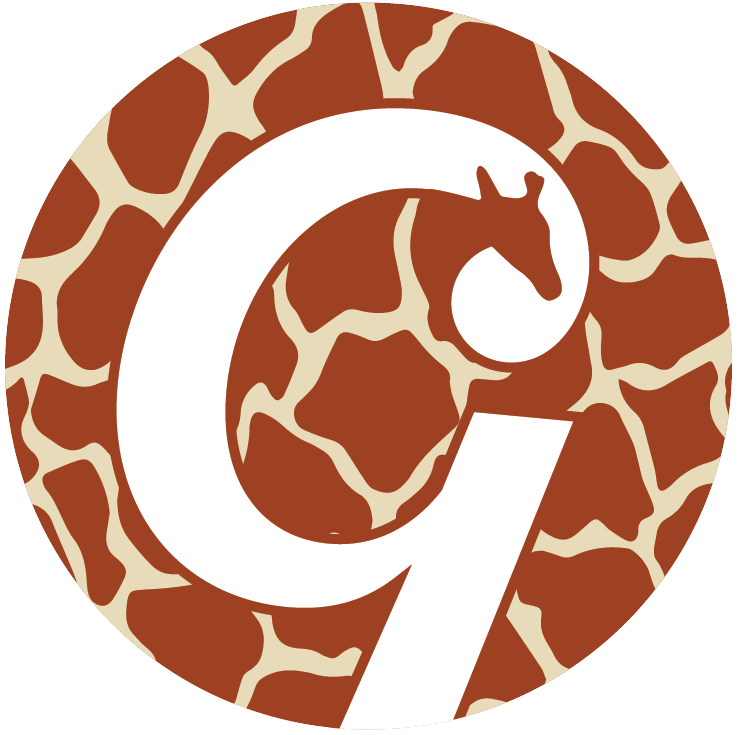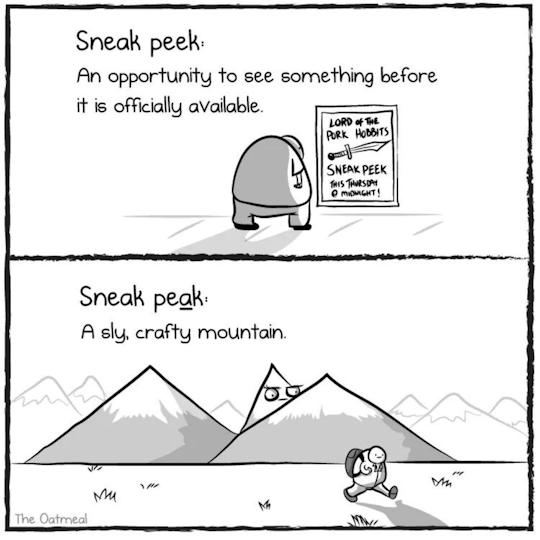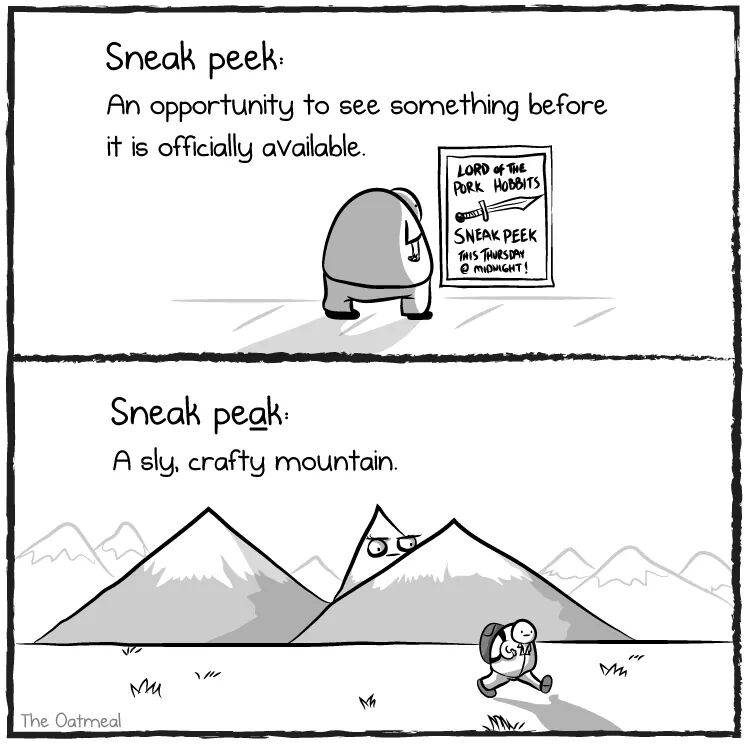This edition will cover some confusing words that are commonly seen on social media. The two main words to focus on today are Peek vs Peak, and the difference between Stationery and Stationary.
Contents:
Peek and Peak
To peek is to take a sneaky quick look at something. When you played hide and seek when you were young, how many times did you get told “no peeking!” while you were counting. Or maybe there’s a new person at your work who you find quite attractive. What do you do? You bob your head over your divider briefly to take a quick peek at them.
Kramer: Hey you know this is the first time we’ve ever seen each other naked?
A quote from Seinfeld
Jerry: Believe me, I didn’t see anything.
Kramer: Oh, you didn’t sneak a peek?
Jerry: No, did you?
Kramer: Yeah, I snuck a peek.
Peak has a few uses. It can refer to the pointed top of a mountain:
- We reached the peak of Mount Everest
- What’s that 90’s movie with Pierce Brosnan?
Dante’s Peak
It can also refer to a high or important level of something:
- Our company reached a peak in sales results last quarter
- Rafael Nadal has reached the peak in his tennis career
- A peak in petrol prices
- Spring is peak season for allergies.
Lastly, it refers to a pointed shape of something:
Make little peaks with the egg white when making a pavlova

Now, a very common phrase is sneak peek. When you take a sneak peek, you’re basically looking at something before the majority of people have seen it. A movie trailer is kind of like a sneak peek. You watch short clips of the movie before it’s released. How many kids take a sneak peek of their presents on Christmas Eve?
Very often, sneak peek is incorrectly written as sneak peak. Remember my duel fuel example? I think we have the same thing going on here. It’s because the spelling changes between words. But don’t be put off! To peek is to sneak a glimpse at something, not peak. Therefore sneak peek!
Let’s take a look at a couple of incorrect examples:

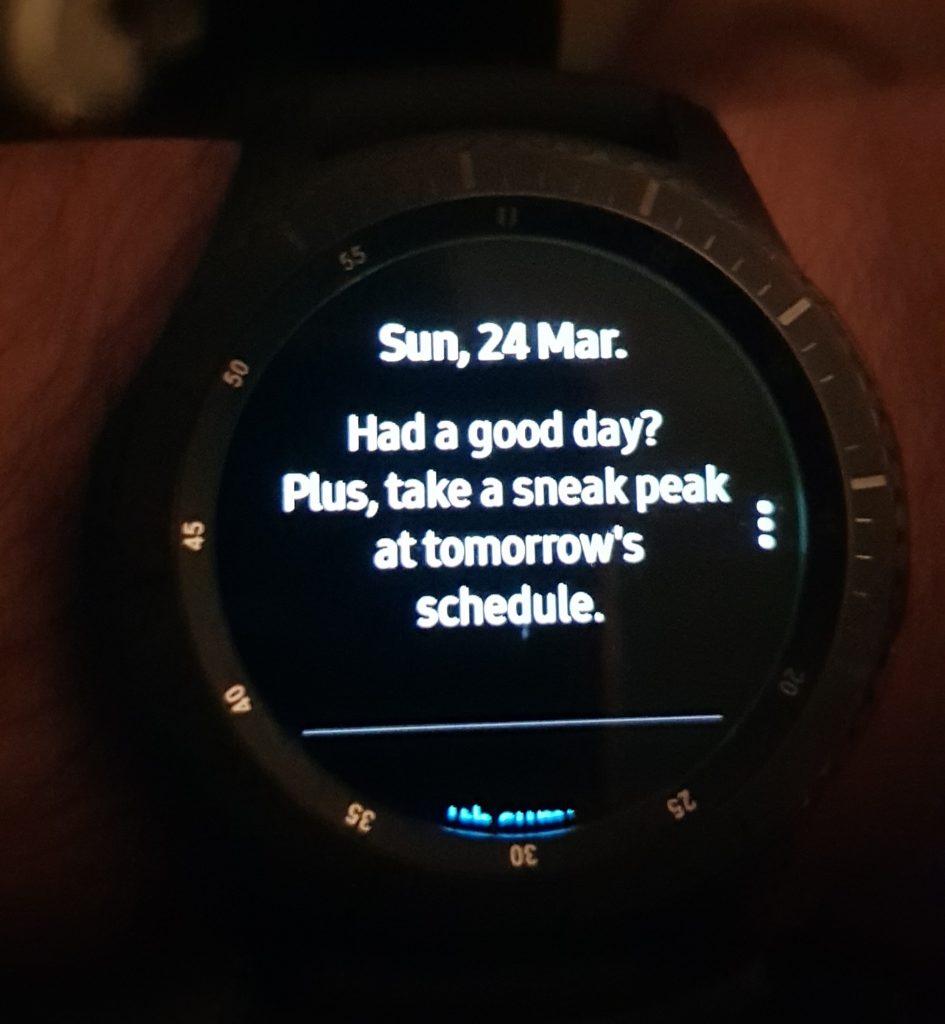
The Oatmeal explains this pretty well:
We should also mention Peking Duck which is sometimes spelt incorrectly as peeking or peaking.

And just to confuse us all even further, there’s also the popular EDM artist called Peking Duk.
Lastly, we have the expression to pique your interest. Honestly, I don’t think it’s widely used anymore, but you deserve to know it! To pique someone’s interests means to excite someone. I guess you could pique someone’s interests by giving them a sneak peek of an upcoming movie. Pique interest – not peek and not peak.
Stationary and Stationery
These two are confused so, so often, and it’s obvious to see why. While there’s a slight pronunciation difference between the two, the main difference is that one is spelt with an A and the other with an E and we’re going to use this to our advantage in a sec!
Stationary, pronounced station-ry, means something is not moving, or still. Your driving instructor might ask you to make a turn or parking manoeuvre from a stationary position. Or what about when you’re on the train and you hurtle past another one? Sometimes it’s hard to tell if the other train is moving or stationary isn’t it? Again, the A after station is not pronounced. Station-ry.
Stationery refers to writing and office supplies. Pens, pencils, paper, erasers, markers, post-it notes, staplers, rulers. You name it; all of these are stationery items! Stationery is usually pronounced as station-airy, but you could also say station-a-ree. I’ve even heard some people pronounce it the same as above with stationary: station-ry. So really, the main difference here is with the spelling as opposed to the pronunciation.
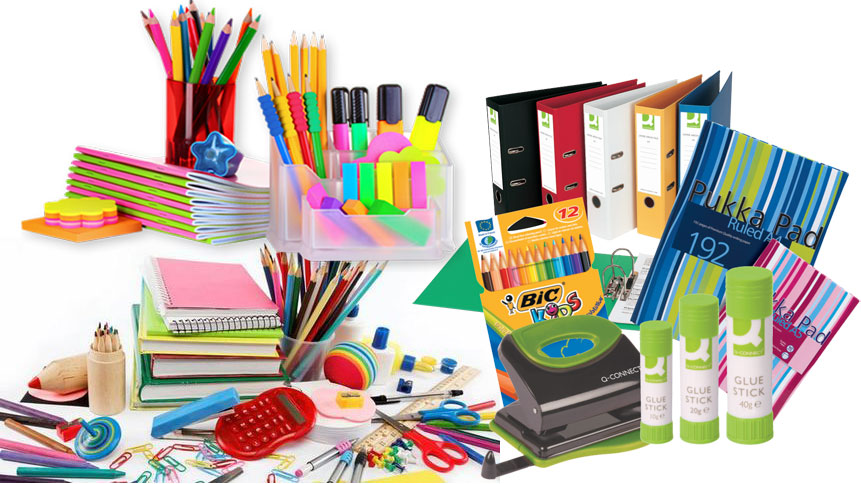
So I guess if there’s a pair of scissors lying on the table, you could say you have a stationary stationery item. No good? Okay, let’s move on…
Now, I did say there’s a trick with this one. If ever you get confused, just think E for envelope. An envelope is an item of stationery, right? Envelopes = stationery with an E. If you don’t want envelopes, well then stationary with an A is the word you want! Easy, huh?
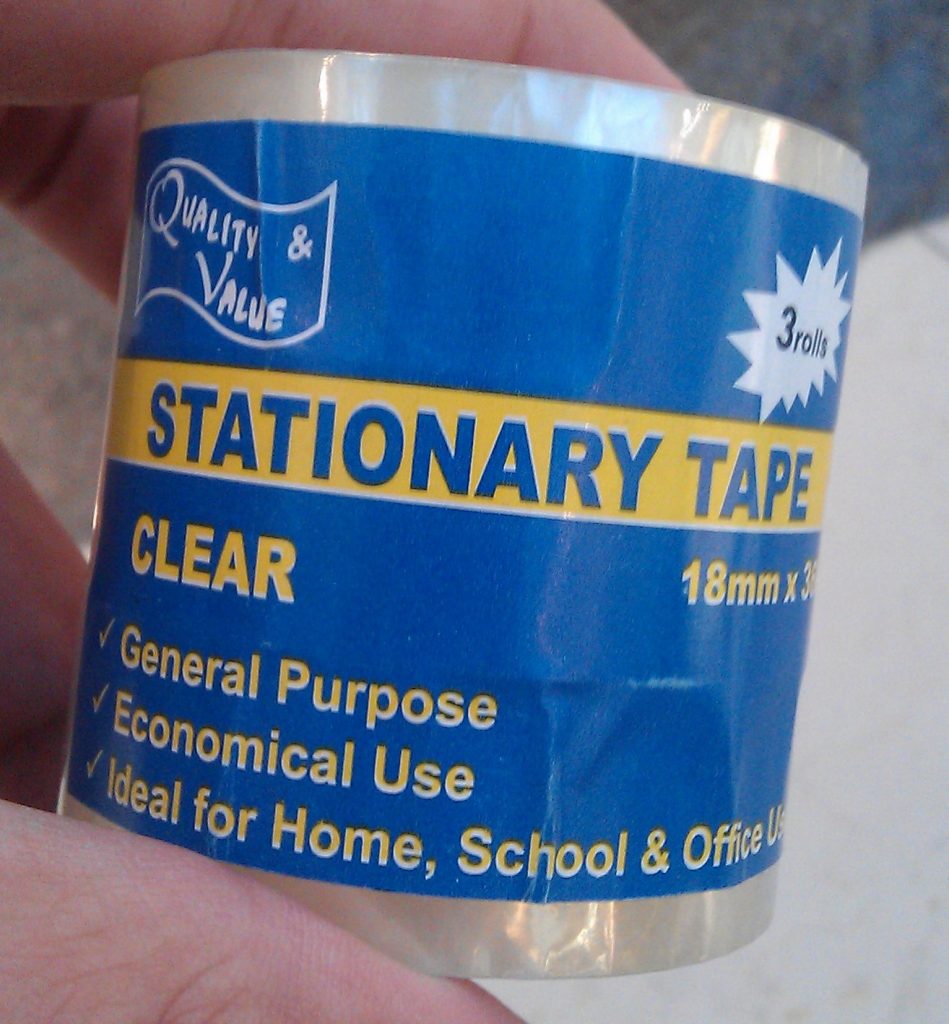
Woman and Women
This is a tricky one. Man and Men never get mixed up, so why are Woman and Women sometimes confused? It’s exactly the same scenario, just with wo in front of it!
Woman = one woman.
Women = more than one woman.
See? It follows the same principle as man and men. One man; two men. One woman; two women. The only difference here is in the pronunciation because this is not the same as man and men.
The wo in Woman is pronounced like the woo in wood. The man in Woman has more of a neutral sound. Think of the name Newman.
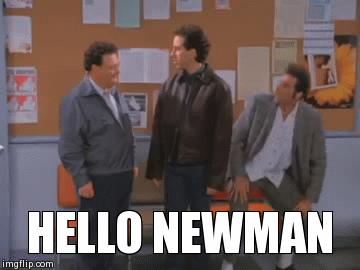
Now, onto Women. Both the wo and the me in Women have very strange pronunciations. They both sound like i! Think of it like wimin. That’s how you pronounce it! Wo as in win and men as in mint.
If ever this word confuses you, just think of man and men and add the wo. It’s that easy!
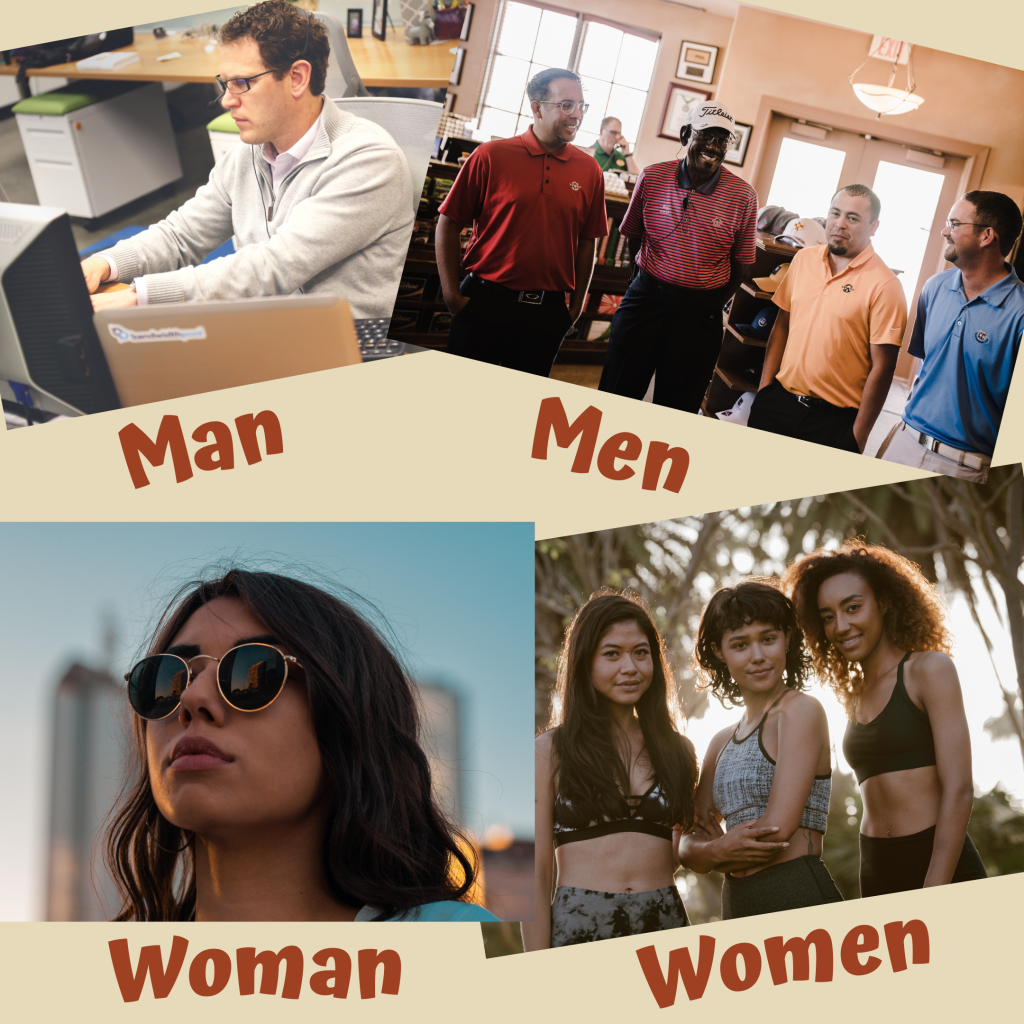
See also Gentleman and Gentlemen as this follows the same rule.
Suppose and Supposed
How many times have you seen someone say on Facebook something like “It’s not suppose to work like that”? It should be ‘supposed’. But why do you suppose that is? Let’s look at these two.
Suppose is a verb used for when you say something that’s not a fact and can’t be proven. You think/believe/assume something is the case:
- I guess Becky ate all the chocolate then.
I suppose so. - Do you suppose Jack will be late for our meeting tomorrow?
- What do you suppose will happen in the next episode of The Sopranos?
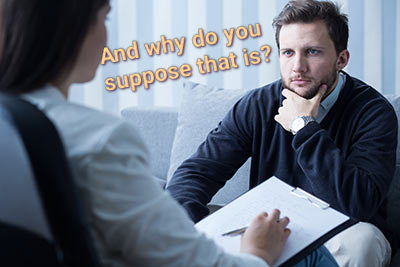
You can replace the word ‘suppose’ with ‘think’ or ‘guess’:
I suppose I’ll answer the phone then / I guess I’ll answer the phone then.
Suppose is sometimes used as a ‘what if’ type of scenario:
- Suppose I hadn’t missed my train that morning. I would never have met you!
- Suppose she doesn’t show up to court! What then?
Now, onto supposed. This is an interesting one because although supposed is the past tense of suppose, it’s not very often used in that way. But let’s look at a couple examples anyway:
- At the time, I supposed she still loved me
- We supposed the man she was with was her husband.
Like I said, not common usage. You’d most likely say ‘assumed’ or ‘guessed’.
The more frequently seen usage of Supposed is used to mean ‘meant to’:
- I was supposed to go to the shops yesterday but I forgot
- You’re not supposed to forge someone’s signature!
- Cinderella was supposed to be home by midnight.
Used in this way, you follow supposed with the word ‘to’. So just remember it’s always supposed to, not suppose. As always, let’s look at some incorrect examples:
- I’m not happy with your service because your app doesn’t do what it’s suppose to do
- My friend said his birthday was suppose to be a grand affair but only three people actually showed up.
Another way Supposed is used is to describe something, and again, it means ‘assumed’ or something you believe is true. Alleged is a good word. Used in this way, it’s pronounced slightly differently: Suppose-zid
- So where is this supposed girlfriend of yours then?
- This is the supposed site of a famous haunted house.
This last usage is where the word Supposedly comes from:
- Where’s Dave today?
He’s supposedly sick - Supposedly, the ghost of an old lady haunts that house in the woods.
Remember it’s Supposedly, not Supposably:
Use and Used
This one is exactly the same as above with Suppose and Supposed. Let’s start by using an incorrect sentence:
You use to be my best friend.
Use has two pronunciations, depending on your use (see what I did there?)
As a verb, it refers to something’s purpose:
- How is anyone meant to use an iPhone?
- I use public transport during the week to get to work
- What do you use this type of screw for?
- I’ll give you this money as long as you don’t use it to buy alcohol.
When you use use as a verb, it’s pronounced like ‘ooze’ but with a Y at the start. Or ‘ewes’. Or, you know how some people say yous for the plural you? Have yous seen that movie with Keanu Reeves and the bus that can’t slow down cause there’s a bomb on it? Yeah, that.
Use is also used as a noun, i.e. the use of something:
- We’re going to lose the match anyway, what’s the use in trying?
- Anakin Skywalker lost the use of his right hand
- Since I’ve recently signed up to Facebook, I no longer have any use for Myspace.
When use is used as a noun, it’s pronounced a little like ‘truce’ and ‘juice’.
Now, onto used. This one has a few uses as well. It’s the past tense of use, in the first scenario we saw above:
- What is this type of screw used for?
- I can’t believe you used the money to buy alcohol after you told me you wouldn’t!
- The printer is broken. Who used it last?
Pronunciation-wise, it’s the same as above but with a D at the end – Yoozed.
Sticking with the same pronunciation, Used also means second hand or worn. Op shops sell used clothing. You might have bought a used car as opposed to a brand new one. You can even buy used tyres these days!

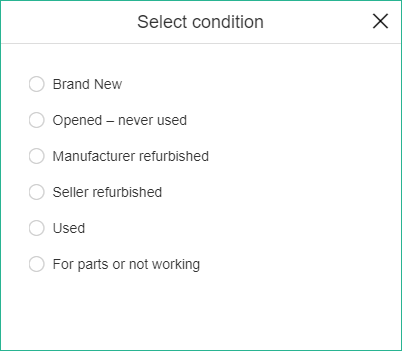
Lastly, the phrase ‘used to’ either refers to an activity which happened regularly in the past but not anymore:
- I used to take public transport every day for work but I’ve since got a new job and drive instead
- She used to use this printer but since it mysteriously broke, she uses that one now,
or it can refer to an activity which has become habitual:
- Sure, prison life is tough but you get used to it
- The manager warned Jack about the loneliness and isolation but Jack said he was already used to the solitude.
Pronunciation-wise, used to is pronounced just like the noun form of use, above, but with a T at the end – Yoost.
To recap:
I used to eat meat but now I’m a vegetarian ✔
We use to make this model but it’s been discontinued ✘
Now that you’ve read the above, you could say that you used to get confused between use and used.
